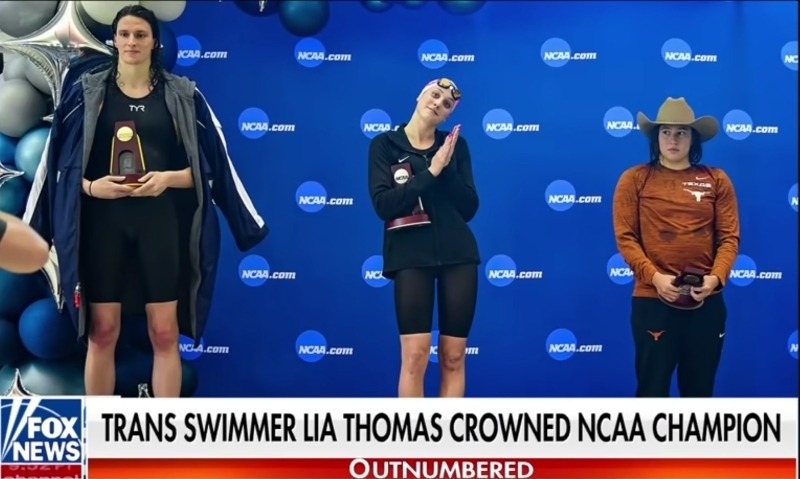
Three former female collegiate athletes have filed a lawsuit after being compelled to compete against and share a locker room with a trans-identified male athlete.
Grace Estabrook, Ellen Holmquist, and Margot Kaczorowski initiated the lawsuit in the United States District Court for the District of Massachusetts, targeting the University of Pennsylvania for allowing trans-identified athlete Lia (Will) Thomas to compete on the women’s swimming team. Estabrook, Holmquist, and Kaczorowski were former teammates of Thomas on the UPenn women’s swimming team.
The complaint seeks a federal court ruling declaring that the defendants violated Title IX, which mandates equal opportunities for women and girls in education for schools receiving federal funding, by permitting Thomas to compete in women’s events. The lawsuit also includes the National Collegiate Athletics Association (NCAA), Harvard University, and the Ivy League as defendants.
The plaintiffs are asking for a declaration stating that Thomas was ineligible to compete on the women’s team, the annulment of all records set by Thomas while participating, and the payment of reasonable attorneys’ fees and costs. While Estabrook, Holmquist, and Kaczorowski are the named plaintiffs, the class-action complaint also represents “all others similarly situated,” referring to female athletes affected by Thomas’ competition on the school's women’s swimming team.
The complaint details events that transpired during the 2022 Ivy League Championships, which featured a combination of group and individual events.
The plaintiffs claim that Thomas’s inclusion on the women’s swimming team allowed for higher scores in group events while simultaneously depriving female athletes of the opportunity to earn honors that rightfully belonged to them. “During their participation in their relays, both Estabrook and Kaczorowski felt shame for swimming with Thomas, recognizing that Thomas tainted the results of their swims and made the competition unfair for opponents,” the lawsuit states.
The lawsuit also notes that “in every individual event that Thomas swam at the Ivy League Championships, Thomas set a pool record — that is, the best women’s time ever swam in the Harvard Blodgett Pool.”
Holmquist, one of five swimmers competing in a swim-off for the final spot on the UPenn women’s swimming team at the Ivy League Championships, learned that she missed the cut by just one spot.
Additionally, Thomas’s participation on the UPenn women’s swimming team allowed the trans-identified athlete to use the women’s locker room. While Estabrook “chose to use the locker room assigned to UPenn because her events generally did not overlap with Thomas’” during the Ivy League Championships, the lawsuit described it as a “disruption to her peace and preparation for her swims knowing that Thomas could walk in at any moment while she was changing.”
“Kaczorowski’s events did overlap with Thomas, and she could not avoid changing at the same time that Thomas did,” the complaint added. “Accordingly, Kaczorowski chose not to use the locker room assigned to UPenn to protect her privacy and avoid the disruption and distraction of sharing a locker room with a man.”
The lawsuit was filed the day before President Donald Trump signed an executive order pledging to withhold federal funds from educational institutions that permit trans-identified males to compete in women’s sports. The day after the executive order, the NCAA prohibited trans-identified males from competing in women’s sports.

















